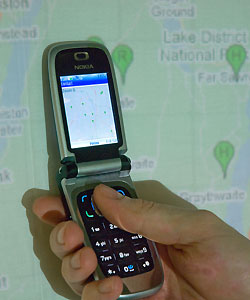Recent Stories
- Businesses urged to tap into science and technology young talent
- Digital relay baton enables remote crowd cheering of athletes
- Health Innovation Campus moves a step closer
- £7.1 million R&D boost for North West businesses
- Centre of excellence created for the next industrial revolution
- Artificial intelligence toolkit spots new child sexual abuse media online
- Strategic partnership set to help plug cyber security skills gap
- What your choice of smartphone says about you
- InfoLabTree: Discover the Story
- novi.digital Launch Event - 'An Event to Help Businesses Grow Online'
RSS Feeds
RSS feeds can deliver the latest InfoLab21 news and events direct to your browser without you having to visit the website.
In most browsers you can click on an RSS link and choose to subscribe to the feed to add it to your favourites or bookmarks.
Industry Funding for Next Generation Mobile Interaction
 New research will investigate mobile interaction with advertisement posters, public screens and maps
New research will investigate mobile interaction with advertisement posters, public screens and maps
Researchers at Lancaster University's InfoLab21 are collaborating with NTT DoCoMo Euro-Labs to develop a new generation of mobile interactions and applications using RFID/NFC technology.
MULTITAG is a £252,000 research project funded by NTT DoCoMo Euro-Labs - an affiliated company of NTT DoCoMo, the primary mobile communications company in Japan.
The two-year project will be the first cooperation between NTT DoCoMo Euro-Labs and a University in the UK.
Mobile interaction with advertisement posters, public screens and maps that are based on RFID/NFC tags or visual markers is regarded as a promising application area in mobile commerce.
However, most currently implemented commercial applications are based on simple interaction paradigms, associating one single object with exactly one tag providing one service at a time.
Multi-tag interactions and applications are driven by the idea of augmenting objects through multiple tags that provide various links to different services.
The aims of the MULTITAG project are: to further analyze multi-tag application and interactions, define guidelines for the development of such systems, establish tool support and provide a solid service engineering basis for the future development of such services.
One concrete prototype currently in development is a system which would allow a mobile phone to be used as a smart stylus. Using this approach, the phone can touch a display at any location in order to perform interactions.
Using a mobile phone in the interaction increases interaction possibilities through phone input modalities (e.g. joystick or keypad), storage capabilities and additional feedback (e.g. visual, audio, and vibration).
Leading the project are Dr. Enrico Rukzio, Professor Hans Gellersen and Robert Hardy in Lancaster University's Computing Department.
Mon 21 April 2008
Associated Links
- Direct Touch-based Interaction with Dynamic Displays - a video of a prototype system which allow a mobile phone to control a dynamic map display
- DoCoMo Euro-Labs - established in November 2000 to conduct research on emerging mobile communications technologies that can respond to the requirements of a highly advanced multimedia age, DoCoMo Euro-Labs is committed to collaborate with operators, vendors, universities and research institutes in Europe
- MULTITAG Project - a research project launched in January 2008 between Lancaster University's Computing Department and NTT DoCoMo Euro-Labs, with the goal of developing new methods and applications for mobile interactions with multi-tagged objects



